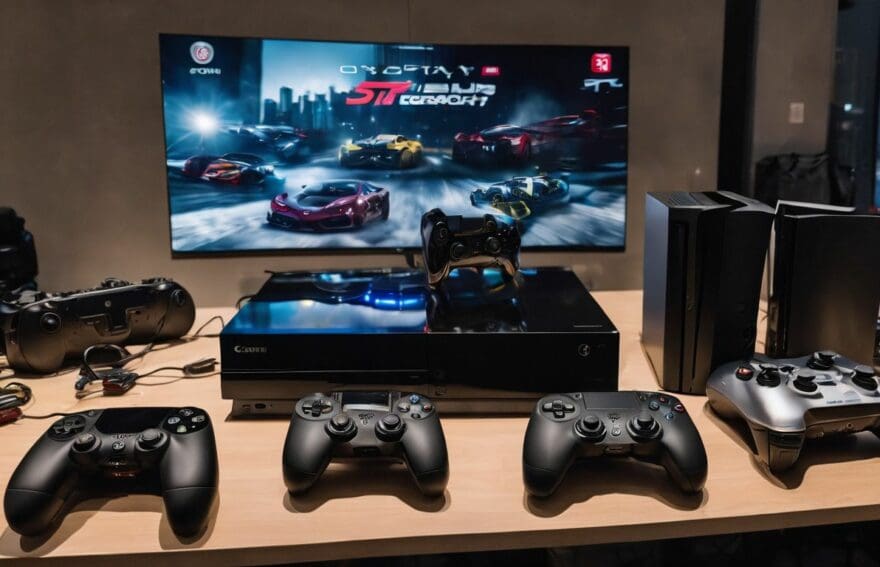Beyond the Game: The Social Impact of the FGC

Updated On: November 29, 2025 by James Connolly
Have you ever pondered over the vibrant tapestry that is the Fighting Game Community (FGC)? It’s a place pulsating with more than just the clatter of buttons and joysticks. We’ve taken quite the journey into its heart, only to find that women have been intricately woven into its storyline for quite some time now.
Our article peels back the layers to reveal an FGC rich in social collaboration and brimming with a distinctive ethos—where virtual skirmishes on screen blossom into enduring bonds off it.
Take a moment, delve in with us, and discover how these gaming encounters are crafting connections in real life!
The Evolution of the Fighting Game Community (FGC)
The Fighting Game Community (FGC) has evolved from a niche subculture to a mainstream force in the gaming industry. The impact of social media has played a significant role in driving its growth and connecting gamers from around the world.
From niche to mainstream
Years ago, we might have felt like a close-knit secret society, but now we’ve watched the Fighting Game Community (FGC) step into the limelight. It’s been a thrilling ride as our once-small gatherings have transformed into major events streamed to viewers worldwide.
Esports and live tournaments showcase our top players’ game skill and knowledge, bringing excitement and recognition to the games we love.
We’re seeing more people join online gaming communities every day, drawn by the allure of competitive gaming and a shared passion for video game culture. Social media channels buzz with discussions about strategy, sharing highlights from gaming events or debating aspects of Japanese gaming culture.
Our community impact grows stronger as inclusivity in gaming becomes not just an ideal but a reality — welcoming all who wish to be part of this dynamic world that goes beyond just playing games.
The impact of social media
Social media has revolutionised the way the Fighting Game Community (FGC) interacts and communicates. Online platforms such as Twitter, Discord, and Twitch have allowed for instant connection between players across the globe, fostering a sense of community and camaraderie.
Through these channels, gamers can share strategies, discuss game updates, and organise tournaments with ease. The FGC’s presence on social media also enables members to showcase their skills to a wider audience, promoting inclusivity and diversity within the gaming subculture.
The impact of social media extends beyond mere communication; it has played a crucial role in shaping the FGC into a global network that transcends geographical boundaries.
The FGC’s Influence on Gaming Culture
Performativity and social gameplay have become integral to the FGC, creating a culture of inclusivity and community that extends beyond the game itself. The emphasis on shared experiences and human connection in gaming has transformed the way players interact with one another, leading to a more dynamic and vibrant gaming culture.
Performativity and social gameplay
Social gameplay within the Fighting Game Community (FGC) involves not only the act of playing but also the performative aspect of showcasing skills and style during matches. This extends to online communication, as players engage in friendly banter, offer advice, and build camaraderie through video game tournaments and fandom.
FGC fosters social interaction by creating a space where players can form lasting connections based on their shared passion for gaming. The atmosphere is more than just competitive; it’s about fostering inclusivity and embracing diversity within a global community.
The importance of performativity and social gameplay lies in its ability to create bonds that extend beyond gaming, providing members with a sense of belonging.
The importance of community and inclusivity
The Fighting Game Community (FGC) is known for its emphasis on community and inclusivity, providing a space where players from all backgrounds can come together to share their passion for gaming.
This inclusive environment fosters a sense of belonging and social connections that extend beyond just playing video games. With a diverse and welcoming community, the FGC breaks stereotypes and promotes diversity, offering a platform for individuals to express themselves authentically while feeling accepted and valued.
Notably, the FGC has created a global network that transcends cultural barriers, allowing gamers to connect and form friendships regardless of geographic location.
Diversity in the FGC goes beyond mere representation; it permeates the culture of gaming within the community. The presence of women and queer individuals in competitive gaming is significant, with games like Guilty Gear enjoying popularity among these demographics.
Challenges and Controversies within the FGC
Racism and discrimination have been persistent issues within the FGC, while corporate influence and commercialisation have also sparked controversy. These challenges highlight the need for greater inclusivity and grassroots values within the community.
Racism and discrimination
Racism and discrimination persist as challenges within the FGC, but the community is actively working to address these issues. The influence of Black culture has been pivotal in providing a home for Black players in the FGC, signifying a step towards embracing diversity.
The community’s color-blind atmosphere sets it apart from other competitive gaming communities, embodying inclusivity while welcoming players from all backgrounds. Despite this progress, there are ongoing efforts to continue promoting equality within the FGC.
The fight against racism and discrimination is an integral part of shaping a more inclusive FGC community. Embracing diversity and dismantling biases remains crucial for cultivating an environment where all gamers feel welcomed and valued.
Corporate influence and commercialisation
Transitioning from the challenges of racism and discrimination within the FGC, we must also navigate the impact of corporate influence and commercialisation. As the FGC has gained more visibility and recognition, there is a growing concern about how commercial interests may affect its grassroots values.
With the rise in sponsorship deals, branded events, and corporate partnerships, it’s essential to consider how these factors might shape the community moving forward.
Corporate involvement in the FGC can bring both opportunities and risks. While sponsorships can provide financial support and help elevate tournaments to new heights, there is a need for careful navigation to ensure that commercialisation does not compromise the unique inclusive culture that defines the fighting game community.
Beyond the Game: The Social Impact of the FGC
This section will explore how the FGC has broken stereotypes, promoted diversity, and created a global network and community beyond just playing fighting games. We’ll discuss how the FGC has had a significant social impact on gaming culture as a whole.
Breaking stereotypes and promoting diversity
The Fighting Game Community (FGC) is breaking stereotypes and promoting diversity, welcoming players from all backgrounds. With a color-blind atmosphere, the FGC provides a sense of belonging and community for its members.
The presence of women in the FGC is significant, as their participation in fighting games shapes the community’s narrative. Additionally, the FGC has a strong queer presence, with games like Guilty Gear being popular within the community.
This inclusive approach supports diversity and challenges traditional gaming stereotypes.
Creating a global network and community
We connect with gamers worldwide, fostering friendships and collaboration opportunities. The FGC embraces diversity, welcoming players from all backgrounds to contribute to the rich tapestry of our global network.
Our community thrives on inclusivity, offering a safe space for LGBTQ+ members and promoting a culture of acceptance. Through social media platforms and gaming events, we actively bridge geographical boundaries and build lasting connections based on our shared love for fighting games.
Our global network celebrates different cultures, blending Japanese influences with other traditions. The FGC’s emphasis on creating a sense of belonging goes beyond just playing games; it extends into forming meaningful relationships that enrich lives outside the virtual arena.
Future of the FGC
As the FGC continues to expand and gain popularity, there is potential for its continued growth and success. However, it is crucial to maintain its grassroots values of inclusivity, community, and diversity in order to uphold the core principles that have made it a thriving social movement within the gaming world.
Potential for continued growth and success
The FGC has the potential for continued growth and success, with an increasingly diverse player base and a strong emphasis on inclusivity. The community’s ability to create a sense of belonging and provide social connections beyond gaming ensures its sustained appeal to players from all backgrounds.
Additionally, the FGC’s commitment to maintaining grassroots values is set to further enhance its presence in the gaming world, creating opportunities for novice gamers to immerse themselves in a community that welcomes diversity and fosters meaningful social interactions.
As we look towards the future of the FGC, its global network and inclusive nature are poised to attract even more passionate gamers seeking social connection within their gaming experience.
Maintaining grassroots values
To maintain grassroots values within the FGC, we uphold a culture of inclusivity, diversity, and community. Embracing our roots ensures that everyone feels welcome and has a voice in shaping the future of the community.
By staying connected to our origins, we preserve the essence of what makes us unique – a supportive network that thrives on passion for gaming.
In upholding grassroots values, we continue to provide a space where all individuals can engage and connect without barriers. This approach fosters an environment where everyone’s contributions are valued and respected.
Conclusion
In conclusion, the FGC fosters a diverse and inclusive community that promotes social interaction beyond just gaming. It breaks stereotypes, promotes diversity, and provides a sense of belonging for its members.
The impact of the FGC extends far beyond the game itself, creating a global network and fostering strong social connections among passionate gamers. With its emphasis on inclusivity and community values, the FGC continues to shape gaming culture and promote social engagement within its vibrant community.
FAQs
1. What is the social impact of the FGC?
The fighting game community (FGC) influences social interaction through gaming and encourages diversity in gaming, including queer representation and breaking down metastereotypes.
2. How does Japanese culture fit into the FGC?
Japanese culture plays a significant role in shaping aspects of the FGC, as many popular fighting games originate from Japan, influencing both gameplay and community interactions.
3. Can video games promote social gaming among players?
Yes, video games often encourage social gaming by bringing people together to play, compete, and connect within the video game fandom.
4. Does the FGC support inclusion for all types of gamers?
Absolutely! The FGC aims to go beyond just playing games by promoting diversity in gaming and ensuring that people from various backgrounds feel included.


